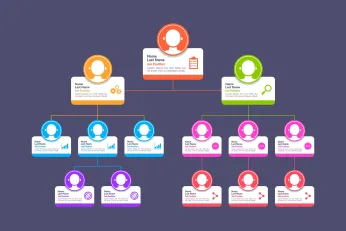Commission in Healthcare: Sales Strategies, Types, Calculation and More
Explore commission structures in healthcare sales, including revenue-based, unit-based, and tiered models. Learn how automation platforms like Compass streamline compensation for better efficiency and motivation.
في هذه الصفحة
The healthcare industry faced a significant turnover rate of 15-20%, raising concerns among leaders about future trends. As we move further into 2025, the pressing question remains: how will this impact costs?
Sales compensation is a crucial factor in this equation. With inflation exceeding 5%, employees are likely to demand higher pay to keep pace with rising living costs. This situation creates a challenging environment for healthcare organizations striving to retain talent while managing expenses.
The healthcare sector extends beyond just delivering quality medical care; it also relies heavily on effective sales and marketing strategies. To motivate sales teams and ensure that essential products and services reach those who need them, many organizations implement sales commission structures. In this blog post, we will explore the intricacies of sales commissions in the healthcare sector.
What do we understand by sales commissions in healthcare?
Sales commissions in the healthcare sector are financial incentives tied to the successful sale of medical devices, pharmaceuticals, healthcare technology, insurance plans, or other healthcare-related products and services.
These commissions can be structured in various ways, such as a percentage of the sale's value, a fixed amount per sale, or a combination of both.
The key goals of these commission structures are to motivate sales professionals, boost revenue, and align sales efforts with organizational objectives.
What do sales representatives in the healthcare sector sale?
Pharmaceutical sales involve many types of medications, vaccines, and medical treatments. Sales reps mainly work with healthcare providers, pharmacies, and hospitals. Physicians are their primary customers, making up about two-thirds of their clients.
Like in any industry, sales reps need education and training. This helps them talk effectively about the drugs they sell. Some specialty products, like opioids or vaccines, require extra training. This is important for understanding these specific markets.
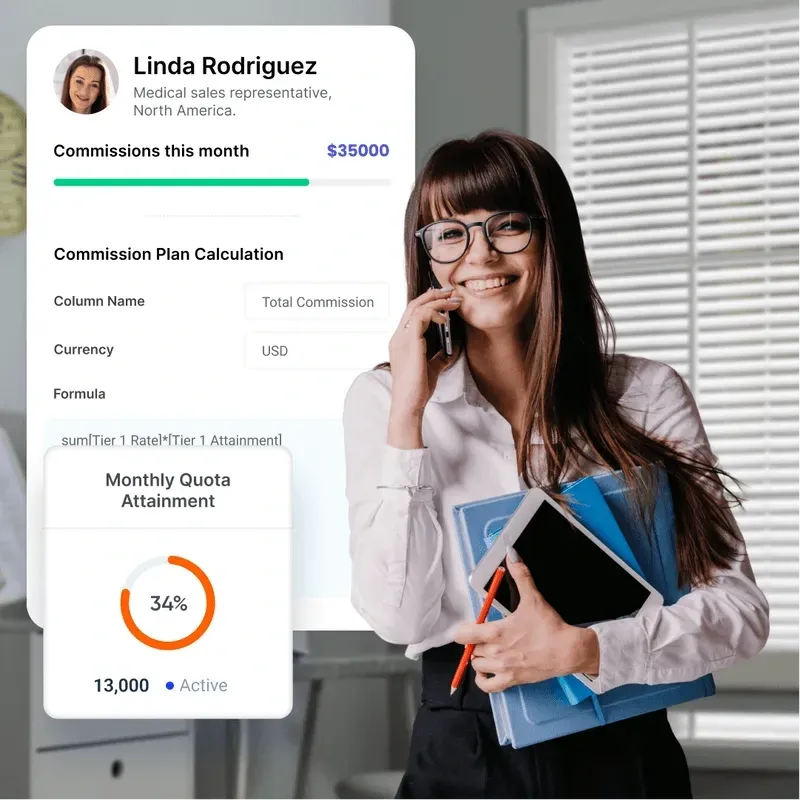
Maximizing the sales performance with Compass in healthcare sector
Enhance the efficiency of medical sales and boost the performance of your sales representatives by harnessing the power of data-driven commission software. Compass, a commission automation platform, simplifies the management and tracking of commission programs and team KPIs, empowering your sales force for greater success.
Book a call now!
How to map sales territories for reps in the healthcare sector for to make better commission structure?
A sales territory is a group of potential clients. These clients are divided by location, product, or demographics. In the pharmaceutical industry, sales territories help reach a wider market. They are a key part of the sales strategy.
1. Pharmaceutical sales territories
- A sales territory is a group of potential clients. These clients are divided based on:
- Geographic location
- Product type
- Customer demographics
In the pharmaceutical industry, sales territories help companies reach more customers. They are an important part of the sales strategy.
2. Geographic location
Dividing accounts by geographic location is often the easiest method. Here’s how it works:
- Travel considerations: This method takes into account how far reps need to travel and how much it will cost.
- Different definitions: Each company may define geographic territories differently. Factors include, the size of the organization, the number of sales reps, the density of healthcare providers in a specific area.
Reps can be grouped by:
- Region
- حالة
- County
- City
- Postal code
3. Account demographics
Pharmaceutical companies often have multiple products to sell. It can be useful to divide territories based on:
- Product type: Different products may target different healthcare needs.
- Healthcare specialties: Some products may be aimed at specific medical fields.
For example, a territory focused on heart medications would target cardiologists. This approach allows reps to become experts in their area, improving their effectiveness.
4. Specialization benefits
Specializing in a specific area has advantages:
- Reps gain more knowledge about their products.
- They can develop better sales strategies.
- Even if travel costs increase, the revenue from specialization can offset these expenses.
5. Combination of account and geographic
Some organizations use both geographic location and account demographics. This method has benefits:
- Cost-effectiveness: It reduces travel expenses.
- Rep specialization: Reps can focus on specific areas of expertise.
For instance, a rep selling heart medications might target all cardiologists on the west coast.
Mapping sales territories in the healthcare sector involves careful consideration of geographic locations and account demographics. Companies must balance travel efficiency with the benefits of specialization to create effective sales strategies.
What are the types of medical sales commission?
Sales compensation is a crucial part of a pharmaceutical sales representative’s total earnings. It includes commissions, bonuses, and other performance-based incentives. While base salaries are paid according to the company’s payroll schedule, commissions are typically paid less frequently, often on a quarterly basis. Compensation structures vary between companies, but most include a mix of the following elements.
In commissions
- Percentage of revenue: This is the most common commission structure in pharmaceutical sales. Sales representatives earn a percentage of the total revenue generated from each sale. The percentage varies based on company policies, product demand, and market conditions. High-demand pharmaceuticals often offer higher commission rates, while lower-demand products come with more modest commissions.
- Unit-based: In this structure, sales reps receive a fixed amount for every unit of a product sold. The unit value and payment rate are determined by the organization. This model is commonly used for established pharmaceutical products with consistent sales patterns.
- Commission tiers: Many pharmaceutical companies implement a tiered commission structure, where sales reps can unlock higher commission percentages by achieving predefined sales targets. This approach incentivizes higher performance, with top sellers earning the most.
There is also bonus
- Bonuses: Bonuses act as additional incentives to push sales reps to exceed their targets. They are often awarded for surpassing quotas, launching new products successfully, or reaching key performance milestones. Bonuses can be structured in different ways, including tiered payouts, lump sum rewards, or performance-based increments. They provide an added level of motivation beyond standard commissions.
A global biopharma company faced challenges in enhancing customer engagement and optimizing its sales operations. The commercial team recognized the need for a centralized analytics platform to improve flexibility in the field and provide quick access to sales insights. A significant issue was the lack of clarity and personalization in the incentive compensation plans for field teams. Leaders aimed to create a more focused approach that would not only motivate sales representatives but also align with changing market dynamics and local healthcare systems.
To address these challenges, the company implemented a cloud-native digital platform designed specifically for incentive compensation management. This platform offered personalized incentive compensation reports that improved the effectiveness of field teams. It also included features that automatically converted data into actionable insights, making compensation plans more engaging.
The implementation of the new incentive compensation platform led to significant improvements across the organization. Sales representatives gained access to personalized insights, enhancing their ability to engage with healthcare professionals effectively. Real-time reporting allowed users to focus on key performance indicators, driving both personal and team success.
This showcases the significance of having a proper healthcare sales rep commission plan in place.
What are the factors for sales commissions in pharmaceuticals and healthcare sectors?
However, there are a few factors that one must consider while designing the sales commissions plan suited for healthcare sector.
- Quotas: Quotas are specific sales goals set by management. They help define company expectations and act as benchmarks for evaluating sales performance. Quotas ensure sales reps have clear targets to work toward and can influence their commission rates and bonuses.
- Accelerators: Accelerators reward top performers by increasing their commission rates when they exceed set quotas. This encourages high-volume sales and ensures the best sales reps maximize their earnings potential.
- Decelerators: On the opposite end, decelerators are used to lower commission rates for underperforming sales reps. If a rep falls below the expected performance threshold, their commission rate may be reduced, prompting them to improve their sales efforts.
- Clawbacks: Some pharmaceutical companies include clawback provisions in their compensation plans. This allows them to reclaim previously paid commissions in cases where a sale is canceled, refunded, or otherwise reversed. The clawback amount depends on company policies and the timeframe between the initial sale and the reversal.
A well-designed pharmaceutical sales compensation plan balances motivation with fairness, ensuring that sales representatives are rewarded for their efforts while maintaining company profitability.
How to calculate the medical sales commission?
With all the necessary data in hand, you can now calculate medical sales commissions. Here's a simplified formula:
For tiered commission structures, you would use different commission rates based on the salesperson's performance level. For example:
Sales up to $10,000: 5% commission rate
Sales between $10,001 and $20,000: 7% commission rate
Sales over $20,000: 10% commission rate
You can apply similar logic for bonus structures, adjusting the calculation based on the specific criteria for earning bonuses.
How can Compass help with commission in the healthcare sector?
Compass simplifies and automates this process, ensuring error-free, on-time commission payouts while maintaining compliance.
1. Automate complex commission calculations
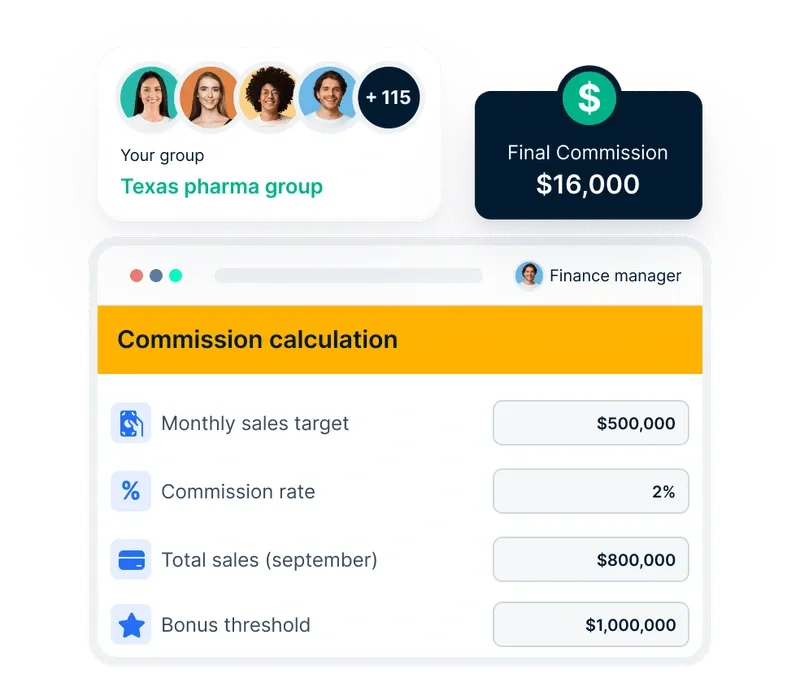
Handling sales commissions in pharmaceuticals involves tracking multiple products, territories, and incentive structures. Compass eliminates manual errors by:
✅ Automating calculations for medical device sales salary commissions and pharmaceutical products
✅ Creating custom crediting rules based on product type, territory, and sales hierarchy
✅ Supporting standalone incentive plans to boost sales for specific products
By leveraging automation, pharmaceutical companies can streamline medical sales commission tracking while ensuring reps receive accurate and timely payments.
2. Ensure compliance with global commission regulations
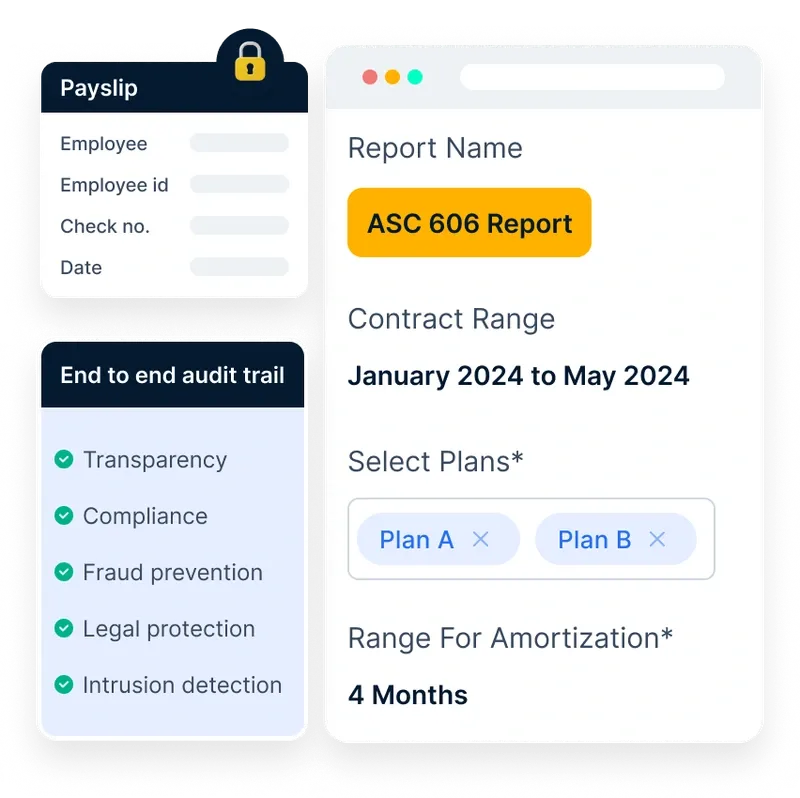
Regulatory compliance is crucial in the pharmaceutical and sales in healthcare industry. Compass provides:
✅ Audit-ready reports for regulatory bodies, ensuring full transparency
✅ A centralized platform that integrates sales data from pharmacy chains, wholesalers, and direct sales
✅ Secure data handling to meet privacy regulations across multiple regions
With Compass, companies can simplify pharmaceutical sales rep commission structure management while maintaining compliance and security.
3. Motivate & retain top pharma sales reps
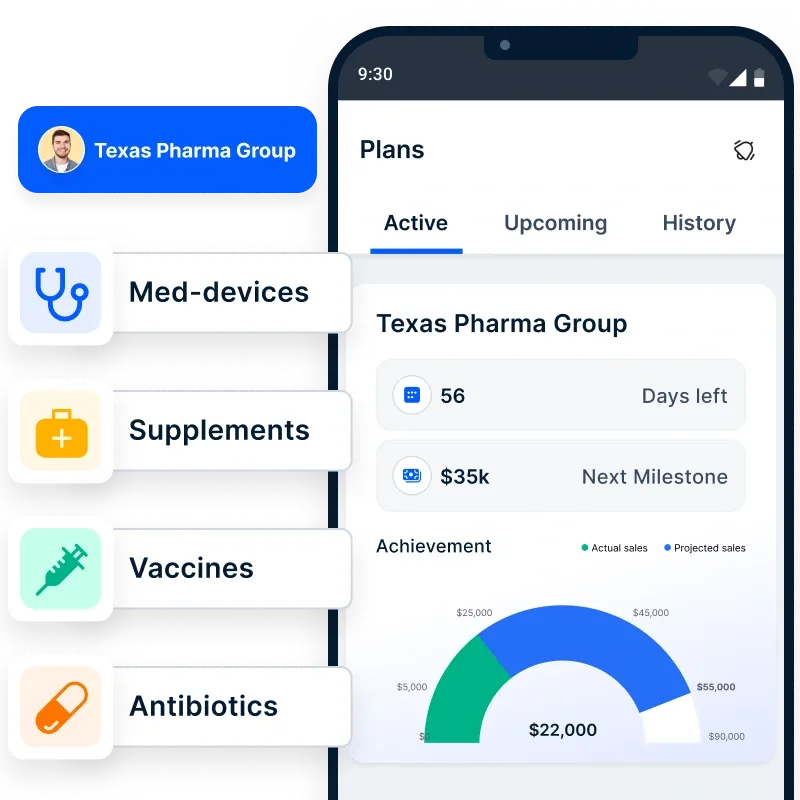
Retaining top sales talent is essential in the medical device sales compensation and pharmaceutical sectors. Compass enhances motivation by:
✅ Offering real-time visibility into potential earnings, eliminating uncertainty in payouts
✅ Providing a mobile app for reps to track healthcare software sales and medical product volumes on the go
✅ Gamifying incentives to keep sales reps engaged and driven
By improving transparency and sales tracking, Compass helps pharmaceutical companies boost sales commissions pharmaceuticals and optimize sales performance.
From pharmaceutical sales commission structure automation to compliance and motivation, Compass is the ideal solution for managing complex sales compensation in the healthcare industry. Schedule a demo today and take control of your commission strategy!
الماخذ الرئيسية
A well-structured commission plan—whether based on revenue percentages, unit-based incentives, or tiered structures—can enhance sales performance and drive business success. However, designing an effective compensation strategy requires careful consideration of factors like quotas, accelerators, and clawbacks to balance motivation with profitability. We learnt:
- Sales commissions incentivize sales teams in the healthcare sector, ensuring effective distribution of medical products and services while balancing retention and cost challenges.
- Common commission models include revenue-based, unit-based, and tiered structures, with additional incentives like bonuses, quotas, accelerators, and clawbacks influencing earnings.
- Mapping sales territories strategically and leveraging commission automation platforms like Compass help streamline compensation, enhance transparency, and drive higher sales efficiency.
By leveraging data-driven commission automation platforms like Compass, healthcare organizations can streamline sales compensation management, improve transparency, and empower their sales teams to achieve higher efficiency and success. Schedule a call now!
الأسئلة الشائعة
What is the normal commission for medical sales?
The normal commission for medical sales typically ranges from 5% to 25%. For medical equipment, commissions generally fall between 15% and 25%, while medical disposables may have lower rates of 5% to 14% due to higher volume sales.
How does commission work in healthcare?
In healthcare, commissions are usually calculated as a percentage of the total sales generated by a sales representative. The commission structure can vary based on product type, market demand, and the specific policies of the company. Commissions may be tiered, meaning reps can earn higher percentages as they meet or exceed sales quotas.
What is the typical commission percentage for sales?
The typical commission percentage for sales across various industries generally falls between 20% and 30% of gross margins. However, in the pharmaceutical and medical device sectors, it often ranges from 5% to 25%, depending on the product and market conditions.
What percentage do medical sales reps make?
Medical sales reps typically earn around 35% of their total income from commissions, with average yearly commissions reported at approximately $44,798. The overall compensation can vary significantly based on performance and the specific company.










